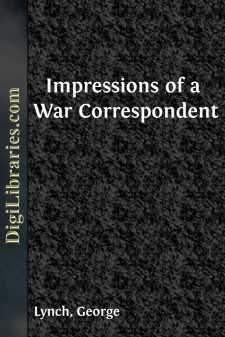Categories
- Antiques & Collectibles 13
- Architecture 36
- Art 48
- Bibles 22
- Biography & Autobiography 813
- Body, Mind & Spirit 142
- Business & Economics 28
- Children's Books 17
- Children's Fiction 14
- Computers 4
- Cooking 94
- Crafts & Hobbies 4
- Drama 346
- Education 46
- Family & Relationships 57
- Fiction 11829
- Games 19
- Gardening 17
- Health & Fitness 34
- History 1377
- House & Home 1
- Humor 147
- Juvenile Fiction 1873
- Juvenile Nonfiction 202
- Language Arts & Disciplines 88
- Law 16
- Literary Collections 686
- Literary Criticism 179
- Mathematics 13
- Medical 41
- Music 40
- Nature 179
- Non-Classifiable 1768
- Performing Arts 7
- Periodicals 1453
- Philosophy 64
- Photography 2
- Poetry 896
- Political Science 203
- Psychology 42
- Reference 154
- Religion 513
- Science 126
- Self-Help 84
- Social Science 81
- Sports & Recreation 34
- Study Aids 3
- Technology & Engineering 59
- Transportation 23
- Travel 463
- True Crime 29
Impressions of a War Correspondent
by: George Lynch
Description:
Excerpt
INTRODUCTION
There are few people in the world who have more opportunity for getting close to the hot, interesting things of one's time than the special correspondent of a great paper. He is enabled to see "the wheels go round;" has the chance of getting his knowledge at first hand. In stirring times the drama of life is to him like the first night of a play. There are no preconceived opinions for him to go by; he ought not to, at least, be influenced by any prejudices; and the account of the performance is to some extent like that of the dramatic critic, inasmuch as that the verdict of the public or of history has either to confirm or reverse his own judgment. There is a peculiar and unique fascination about this reading of contemporary history, as it grows and develops while one peers with straining eyes through one's glasses. There is something like a first night, too, about the way the critics view things. Sometimes great difference of opinion. I recollect the afternoon of Nicholson's Nek—Black Monday, as it was afterwards called—when we returned into Ladysmith half the correspondents seemed to be under the impression that the day had been quite a successful one; while, on the other hand, one had headed his despatch with the words, "Dies Iræ, dies illa!" To get to the heart of things; to see the upspringing of the streams of active and strenuous life; to watch the great struggles of the world, not always the greatest in war, but the often more mighty, if quiet and dead silent, whose sweeping powerfulness is hidden under a smooth calmness of surface—to watch all this is to intimately taste a great delicious joy of life. The researches of the historian of bygone times are fascinating—absorbingly fascinating, although he is always handicapped by remoteness; but the historian of to-day—of his day—this day—whose day-page of history is read by hundreds of readers, the day after has set to him a task that calls for all, and more than all, that he can give—stimulates while it appalls, and would be killingly wearying if it were not so fascinatingly attractive. That close contact with the men of this struggling world, and the men who do things, and shove these life-wheels round, warms up in one a great love for one's kind—a comrade feeling, like that which comes from being tent-mates in a long campaign. Two o'clock in the morning wake to the tramp, tramp of men marching in the dark—marching out to fight—and the unknown Tommy you march beside and talk to in low voice, as men talk at that hour, is your comrade unto the day's end of fighting; when returning, to the sentries' challenge you answer "A friend," and, dog-tired, you re-enter the lines, welcomed by his sesame call, "Pass, friend; all is well."
I
THE DANCE OF DEATH
Death from a Mauser bullet is less painful than the drawing of a tooth. Such, at least, appears to be the case, speaking generally from apparent evidence, without having the opportunity of collecting the opinions of those who have actually died....


